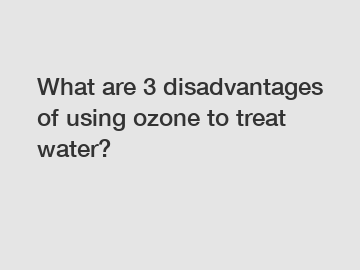What are 3 disadvantages of using ozone to treat water?
Water treatment is crucial for maintaining clean and safe drinking water for the population. Many methods are employed to eliminate harmful contaminants, and one such approach is the use of ozone. Ozone treatment involves the application of ozone gas to purify water by oxidizing and eliminating microorganisms and pollutants. While this method is effective and environmentally friendly, it is not without its drawbacks. In this article, we will explore three disadvantages of using ozone as a water treatment method.
Disadvantage 1: High Initial Investment.
Implementing an ozone water treatment system can require a significant upfront investment. Ozone generators, which produce ozone gas, can be expensive to purchase and install. In addition, the infrastructure needed to support the ozone treatment process, including delivery and monitoring systems, can also drive up the overall cost. For smaller communities or regions with limited financial resources, the capital expenditure required for ozone treatment may simply not be feasible.

Disadvantage 2: Limited Stability and Short Lifecycle.
Ozone has a relatively short half-life, meaning it breaks down quickly. This instability necessitates the generation of ozone on-site, as supplying pre-packaged ozone would be impractical due to its fleeting nature. Consequently, ongoing maintenance is necessary to ensure consistent ozone production and treatment efficiency. The additional costs associated with regular servicing and replacing parts can pose challenges for facility operators. Furthermore, the lifespan of ozone generators can be shorter compared to other water treatment technologies, further adding to overall maintenance costs.
Disadvantage 3: Energy Consumption.
Producing ozone gas requires a significant amount of electrical energy. The ozone generation process often relies on high-voltage electric currents and advanced equipment, consuming more power compared to other water treatment methods. This increased energy requirement adds both financial and environmental burdens to the treatment process. Higher energy consumption translates into increased utility bills and contributes to overall carbon emissions, making it less sustainable in the long run.
Conclusion.
While ozone treatment offers numerous benefits, it is important to consider the disadvantages that accompany its use for water treatment.
The high initial investment required for implementing an ozone treatment system can be a barrier for communities with limited financial resources. Additionally, ozone's limited stability and short lifecycle necessitate ongoing maintenance and replacement of equipment, driving up operational costs. Lastly, the significant energy consumption associated with ozone generation increases utility expenses and has a negative environmental impact.
Despite these disadvantages, ozone remains a valuable water treatment option due to its effectiveness in disinfection and the absence of harmful byproducts. Ultimately, the suitability of ozone treatment depends on factors such as available budget, water treatment needs, and environmental considerations.
If you have any further questions or need assistance in choosing the right water treatment method, feel free to contact us. Our team of experts will be happy to help.
Contact us today to explore the most suitable water treatment option for your requirements!
Remember, clean and safe water is a necessity, and with the right treatment method, it can be achieved effectively and efficiently.
If you are looking for more details, kindly visit commercial ozone water treatment systems, ozone generator for aquaculture, Kitchen Exhaust Ozone Generator.


